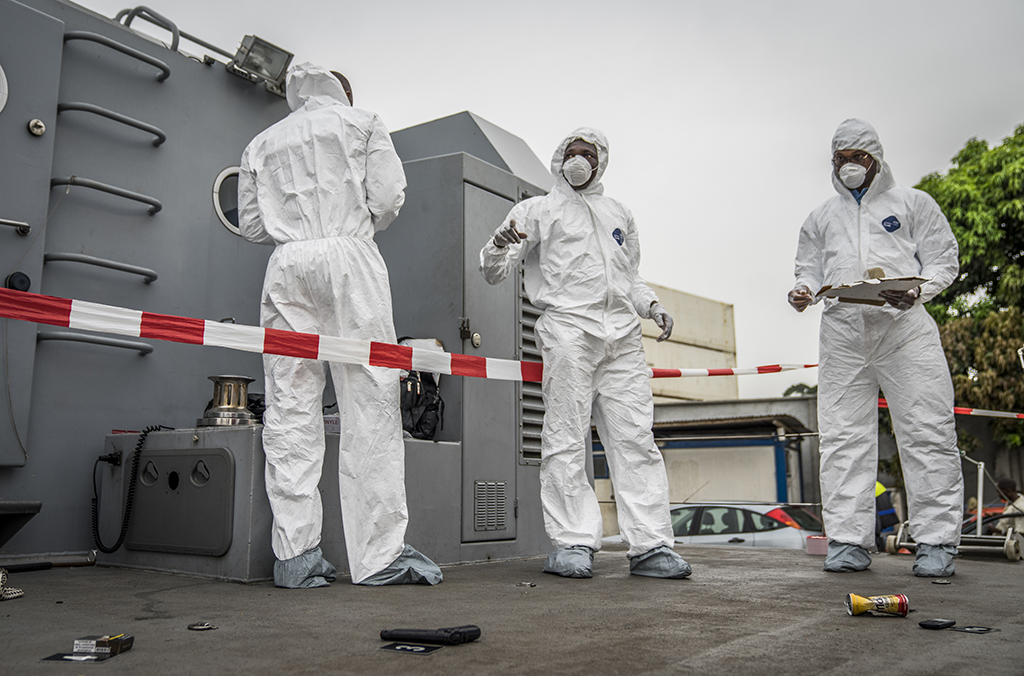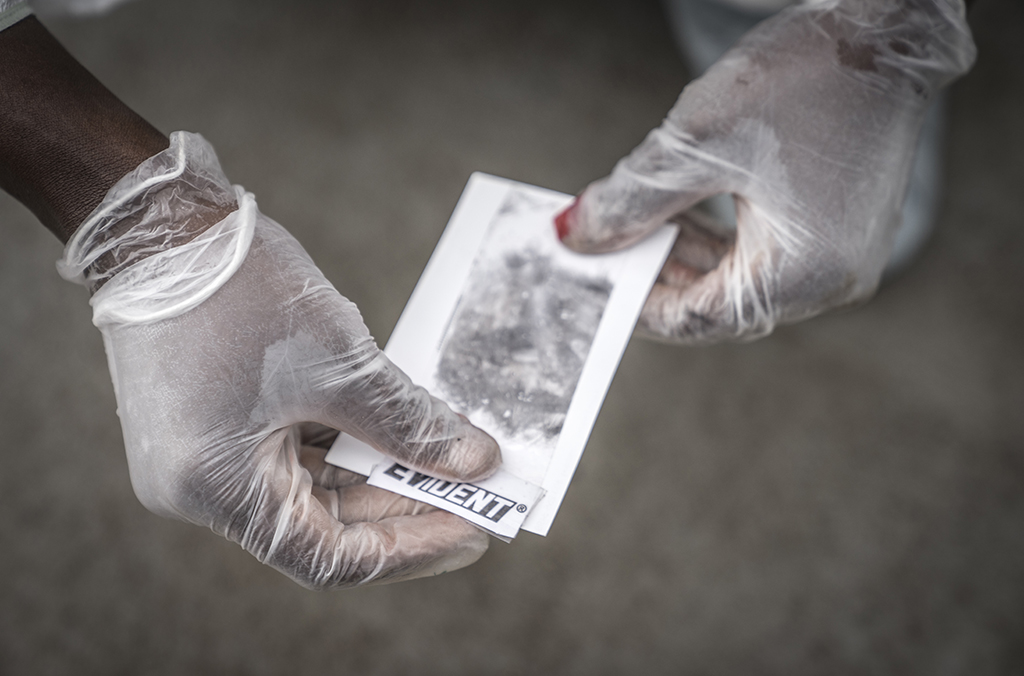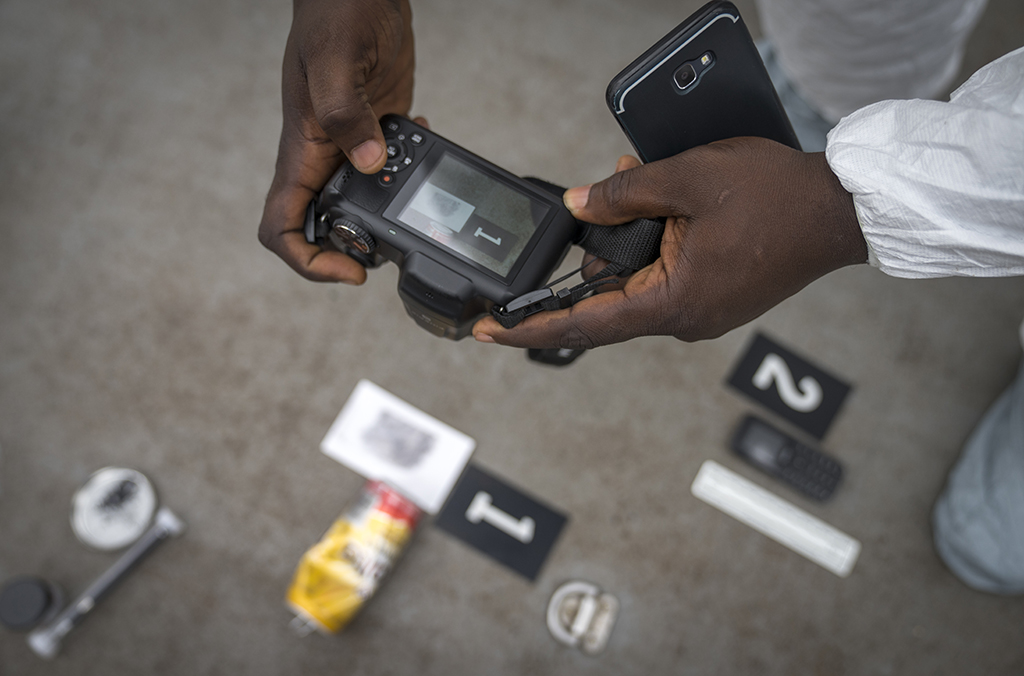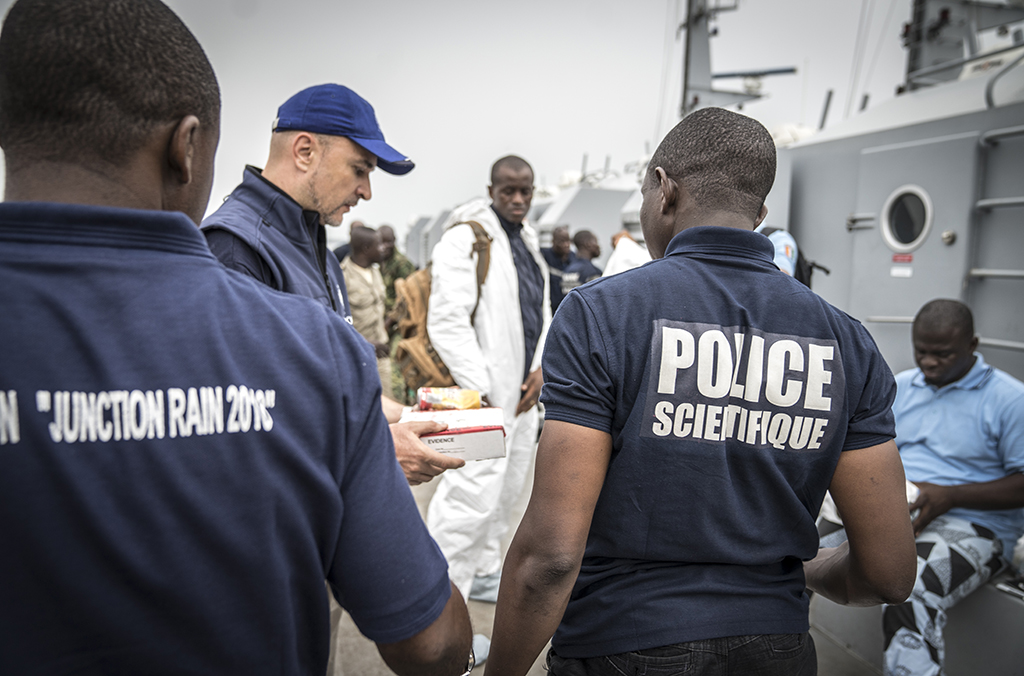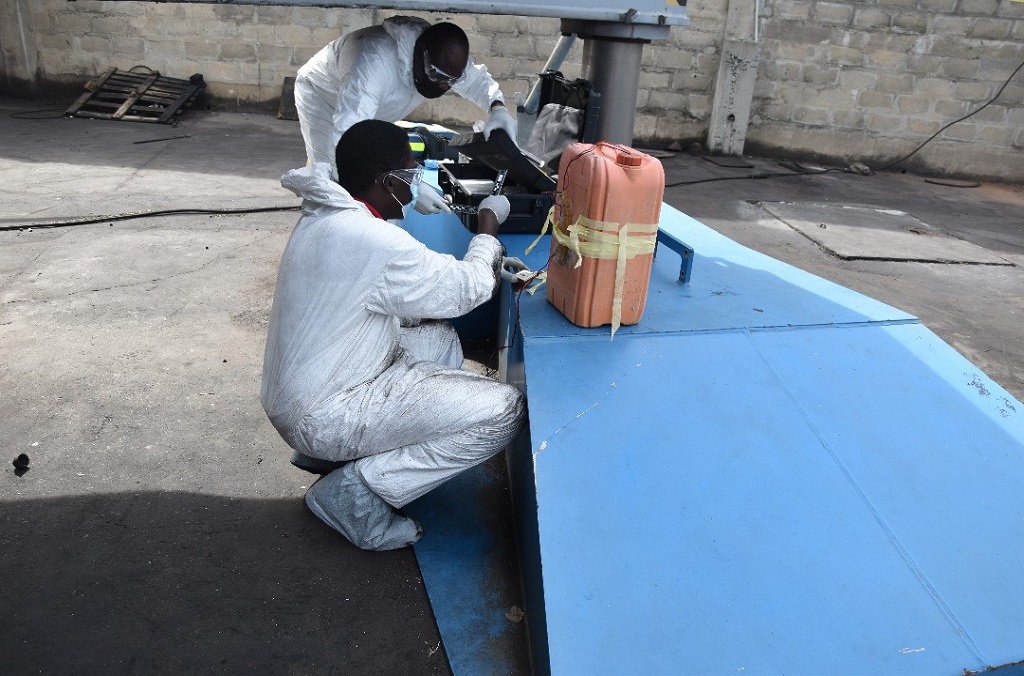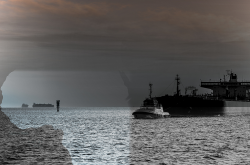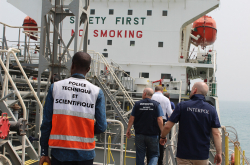Project AGWE
Donor: United States Department of State, Bureau of International Narcotics and Law Enforcement Affairs (INL)
Timeframe: 2015-2024 (four phases)
Budget: EUR 8.1 million
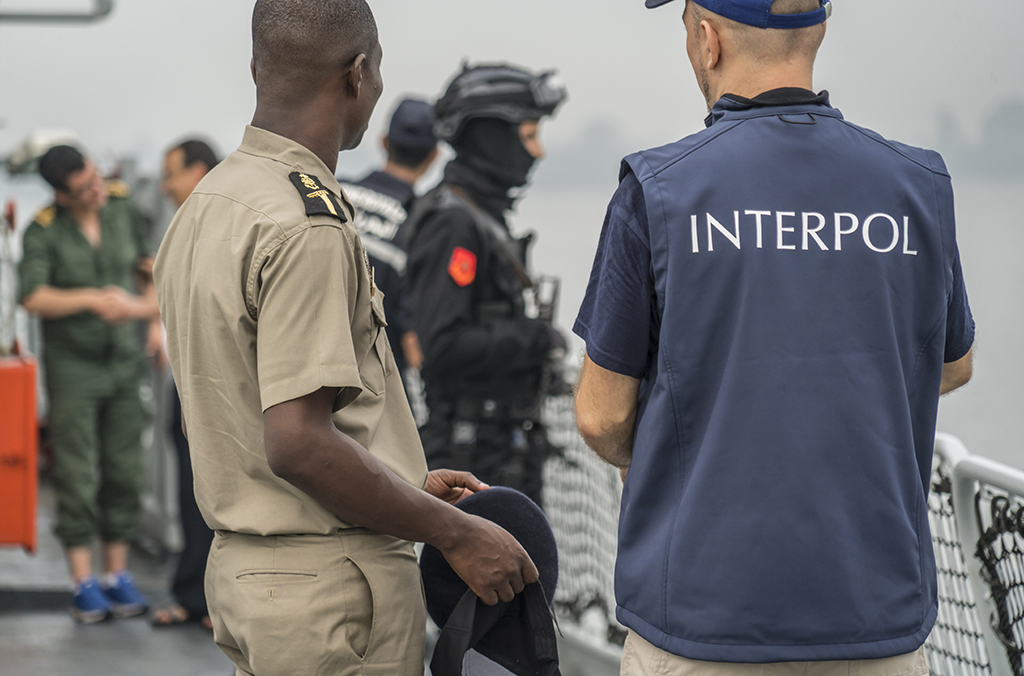
Situation
The Gulf of Guinea is a vital hub for international trade. However, in recent years, this region has become one of the world’s major piracy hotspots. Pirate groups kidnapped more than 400 seafarers for ransom in the Gulf of Guinea between 2019 and 2023. Additionally, some pirate attacks in the region involve stealing oil products, which are later processed and sold on the black market.
Other maritime crimes in the Gulf of Guinea include illegal, unreported and unregulated fishing, trafficking in counterfeit goods, drugs and arms, as well as human trafficking and people smuggling. Terrorist attacks against port infrastructure represent another key risk in the region. All of these security threats have a serious impact on the socio-economic development of both coastal and landlocked regional countries.
Regional collaboration between law enforcement agencies is essential to address these threats and ensure the security of the maritime environment. This need is recognized in United Nations Security Council Resolution (UNSCR) 2634, which urges all UN Member States “to share information with INTERPOL for use in the global piracy database through regional information sharing arrangements.”.
Project activities
Our Project AGWE enhances maritime law enforcement capabilities in five countries in the Gulf of Guinea – Benin, Côte d’Ivoire, Ghana, Nigeria and Togo – by linking first responders, investigators and prosecutors, and increasing cross-border collaboration.
Activities under Project AGWE include:
• Training: these sessions cover the established international methodologies of investigating and prosecuting maritime piracy and other maritime-based organized crime.
• Mock crime scenes and trials: INTERPOL experts create scenarios, based on real cases that occurred in the region, and provide “evidence” for first responders, law enforcement officials and prosecutors to practice the application of the law.
• Exchange visits, investigative meetings and case coordination meetings: officials from beneficiary countries work side by side with their colleagues in other countries and discuss cases of common interest or concern.
• Investigative and analytical support: project officers and analyst provide hands-on mentorship to local officers to counter any type of crime and terrorism occurring in the maritime domain.
Key successes
• Over 900 officials trained through 78 capacity building activities (from February 2015 to December 2023).
• Beneficiary countries have improved their capabilities to coordinate at the inter-agency level, process a crime scene, and conduct crew interviews.
• Assisted the Nigerian Navy to establish a Maritime Crime Investigation Desk.
• Extended INTERPOL’s I24/7 system to maritime units and harbors.
• Supported two successful piracy prosecutions in Togo and in Nigeria, as well as a prosecutions of crew members involved in drugs trafficking by sea.
• In cooperation with international partners, facilitated information sharing that resulted in the seizure of 4.7 tons of cocaine in the Gulf of Guinea.
• Organized investigative support meetings that led to the arrest of a high-ranking organized crime group member involved in international drug trafficking by sea affecting West Africa.
• Supported Nigeria and Togo to publish several INTERPOL diffusions and Blue Notices concerning maritime piracy suspects.
Project updates
November 2022
Arrest of drug trafficking kingpin
Coordinated law enforcement action led to the arrest of the head of a multinational criminal organization, who was wanted internationally. The Nigerian national had fled Brazil following the seizure of 4.9 tons of cocaine worth hundreds of millions of dollars at the port of Rio de Janeiro, Brazil, in October 2021.
Just over a year later, a Red Notice was issued against the suspect following investigations conducted by the Brazilian Federal Police in partnership with INTERPOL (Projects Agwe, Compass and Port Security) and the US Drug Enforcement Agency. The suspect was found to be moving quickly across different countries in the Caribbean.
Swift action ensued among law enforcement agencies in multiple countries. Among them, the Immigration Services in Barbados, the INTERPOL Liaison Office for the Caribbean, and INTERPOL National Central Bureaus in Brazil, Barbados, Suriname, Trinidad & Tobago and Panama.
Less than 48 hours after publication of the Red notice, the individual was located while in transit in Barbados and escorted back to Brazil to face justice.
May 2022
Mock crime scene exercises
On 9 May 2022, Project AGWE coordinated a mock crime scene exercise in the harbor of Lome. Officers from Togo police exercised their skills following a simulation of a terrorist attack targeting the critical infrastructure of the harbor. These exercises were followed by a mock trial as part of the joint efforts of INTERPOL and UNODC to tackle maritime crime.
March 2022
Mock crime scene exercises
Local officers from forensics units in beneficiary countries (previously trained under Project AGWE) delivered training as part of Obangame Express, a series of international, interagency naval exercises (OE22). The aim was to teach VBBS (Visit, Board, Search and Seizure) navy teams to preserve maritime crime scenes.
In addition, Project AGWE coordinators organized mock crime scene exercises under the umbrella of OE22 scenarios at sea, including piracy, drugs, arms trafficking, etc.

November-December 2021
Training in Mauritius
Two training courses – one on crime scene investigation and one on instructor development – were delivered jointly by Projects AGWE and Compass in Mauritius, with support from the US Naval Criminal Investigative Service (NCIS) and the Mauritian authorities. These courses will reinforce first response efforts and information sharing among countries in the East and West Africa, Southern Africa and Indian Ocean region.
June 2021
Training in Ghana
We organized a mock maritime crime scene exercise in Tema for trainees from Ghanaian law enforcement. This was part of a tabletop exercise organized by the UNODC Maritime Crime Programme to enhance maritime crime investigations and will be followed by a joint UNODC-INTERPOL mock trial.
April 2021
Online training
Our new online training course on Interviewing and Interrogating Techniques is now available on the INTERPOL Virtual Academy platform. Developed jointly by INTERPOL’s Port Security Project and Project AGWE, it is available in English, French and Portuguese, to cover all languages of our beneficiary countries. The two project teams delivered a virtual webinar on this topic to 200 participants from 13 countries in East, West and Southern Africa (22-23 April).
October – December 2020
Mock trials
INTERPOL Project AGWE and the UNODC Global Maritime Crime Programme coordinated four mock trials focusing on piracy scenarios in Benin, Ghana, Nigeria and Togo. Taking place during the COVID-19 pandemic, the mock trials were delivered via teleconference platforms for remote attendees, and by in-person meetings where the health situation allowed.

October 2020
Project AGWE mentorship mission
The project mentor acts as a key link between national first responders, local police officers, prosecutors and the wider INTERPOL network of member countries. As such, the project mentor provided investigative support to authorities in Benin and Nigeria on ongoing cases, from the initial incident, through investigation to prosecution. This included offering technical advice, promoting information sharing within the Project AGWE network and encouraging the use of INTERPOL databases.
September 2020
Coordination meeting
Owing to the challenges posed by the COVID-19 pandemic, Project AGWE held a fully virtual case coordination meeting on 8-9 September, bringing together representatives from all five project beneficiary countries to discuss cases of common interest.
August 2020
Online meeting
INTERPOL hosted an online meeting for officials from two Project AGWE beneficiary countries to advance an ongoing investigation of pirate attacks that took place in the Gulf of Guinea. INTERPOL provided analytical support to the investigating country and participating officials identified steps to fill in the existing information gaps.
February 2020
Strategic Dialogue Workshop on West and Central Africa Maritime Security Training Capacity
Recognizing the acute need for a harmonized regional approach to training, the Workshop produced a set of strategic recommendations for achieving sustainable capacity building and training in West and Central Africa within the framework of the Yaoundé Architecture.
Participating in the Workshop were representatives from 18 countries of ECOWAS (Economic Community of West African States) and ECCAS (Economic Community of Central African States); five partner countries from outside the region; 20 regional and international organizations; and other agencies engaged in fighting maritime crime from additional partner countries.
The Workshop was held from 25 to 28 February in Accra, Ghana, and was organized by INTERPOL, the Interregional Coordination Centre (ICC) in Yaoundé, the United States Department of State and UNODC. The event was made possible thanks to support and funding from the United States Bureau of International Narcotics and Law Enforcement Affairs (INL) and the Kingdom of Norway.
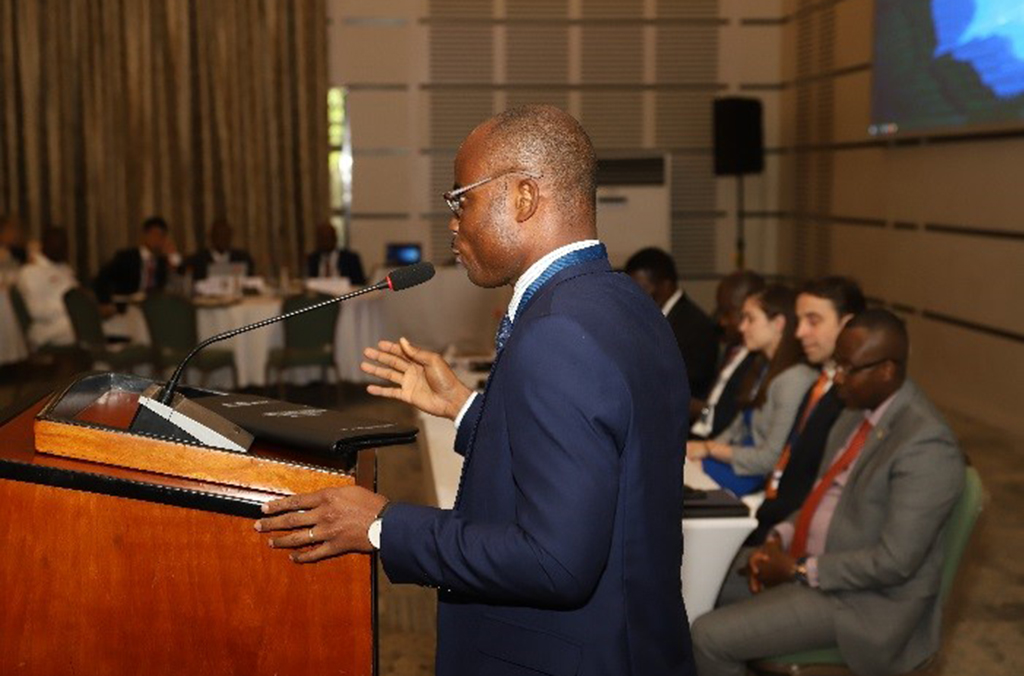
2019
Training on evidence collection
Five training courses were delivered in 2019:
- Côte d'Ivoire, 6-10 May 2019
- Benin, 13-17 May 2019
- Nigeria, 16-20 September 2019,
- Togo 14-18 October 2019
- Ghana: 21-25 October 2019.
More than 20 officers from each country – representing first responders, investigators and prosecutors – were trained in techniques to preserve a crime scene and collect evidence in maritime crimes.
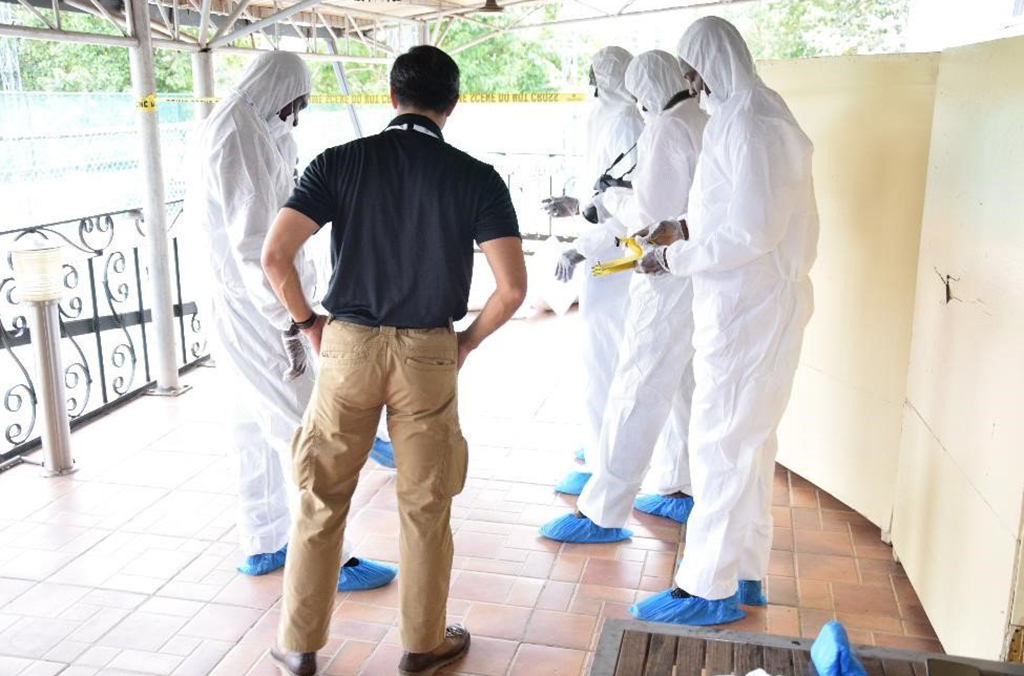
December 2019
Case coordination meeting
This meeting enabled participants to share intelligence on ongoing and historical maritime cases in the Gulf of Guinea. For the first time under the auspices of Project AGWE, the Coordination meeting brought together the project’s five beneficiary countries as well as representatives from France, Germany, the Netherlands, the Republic of Korea, Spain, Switzerland and the United Kingdom.
March 2019
Mock crime scene exercises
Five mock crime scene exercises were held in Benin, Côte d’Ivoire, Ghana, Nigeria and Togo. Officers built on their previous training under Project AGWE through an exercise known as Obangame Express which simulated the processes involved in interagency cooperation and collection of evidence. These officers went on to be involved in live piracy and maritime crime investigations, where they proactively applied the skills acquired during the training courses.
Countries involved
Related documents





